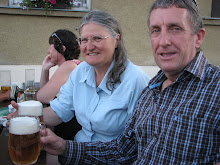Public transport is limited in Cyprus. We were told that the taxi companies pay the bus companies not to run buses. This means there are very few buses but lots of mini vans running as shared-taxis. You call the taxi company and they pick you and lots of others up from where ever you are and drop you all off in order at the places you want to go at the end of the run. This means you have to have access to a phone and the company number, or you need to know where the office is so you can wait there, or you have to be lucky that a shared taxi is passing where you are waiting and has space for you and your bags.
We stayed in an old, cold, uninsulated hostel run by two old men, Older than us, that is. The hostel overlooked the small pedestrian street so it was quiet. We met people who had come from the Middle East so we were able to get some information on Jordan and places to go and we were able to give them some information too. This is such a nice thing about hostelling.
It was a two day holiday in Lemesos and the waterfront sculpture park was full of picnickers. It looked like every migrant worker had been given a day off and they were eating their traditional food and catching up with other workers from their country. Many of the middle class and wealthy Cypriots want to have nannies, gardeners and housekeepers so they register them as students at any of the numerous universities. This means that they can get a visa to be in the country. Of course they don't attend the institution and instead they work for low rates illegally.

We saw a Russian supermarket, a Polish, and a Philippino one. We also saw groups of Chinese, and Africans. We overheard some one saying it felt like they had landed in the Middle East already.
There was a carnival parade as part of the holiday so we watched it for an hour or so and then left. There were about 100 floats/dance groups and lots more spectators than in Pafos and one day of parade watching was enough for us. We did see a few groups promoting the 'Save water, Save life' campaign as Cyprus is in a drought. Some of the Brit groups promoted their goods and services; gyms, drama clubs, vehicles for sale, judo groups.

After the parade there was a DJ in the old city area. This area has been renovated and now has expensive restaurants and shops selling local produce. They produce a wine from an ancient grape, and sell pistachio, walnuts, and almonds. We tasted some 'Cyprus delight' , as opposed to Turkish Delight, with all kinds of flavours. Many of the old buildings were warehouses for carob which used to be grown in large amounts here but I think that has been replaced by tourism.
John was very interested in the ovens where they cook food and would like to try to replicate one when we return. 'Thieves lamb' or kleftikos is a traditional dish cooked slowly in the oven. Old court records tell of villagers stealing lambs from shepherds. The villagers would leave the lamb cooking slowly in a cave. The shepherds would call the police. When the police found the cooking lamb, attracted by the smell, they would wait by the food to catch the culprits.

